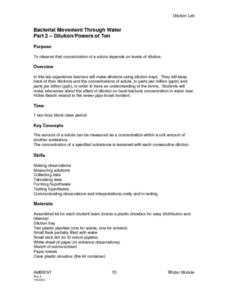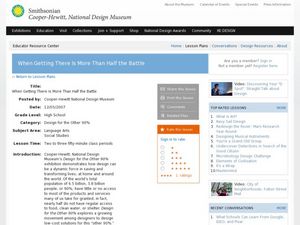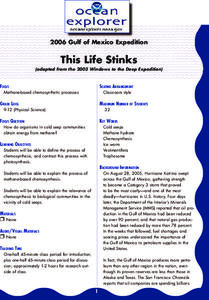Chymist
Visualizing pH
Why are acids and bases important in our daily lives? Lead the class in answering this question, among others, as they experiment with pH paper and classify where various substances belong on the pH scale. They also taste common acids...
Journey Through the Universe
Our Solar System
Take your class on a journey through our solar system. Learners explore each planet, from Mercury to Pluto, and discuss various features that differentiate one from another. They complete activities related to the topics and discuss the...
Curated OER
Education, Design & Empowerment: Part One
Students consider the connection between poverty and education. In this language arts and social studies lesson plan, students research primary and secondary sources in order to explore the relationship between education and poverty.
Curated OER
How Much Is A Million
Help young learners visualize the concept of "a million." To convey concepts of numeration and literacy, they will listen to the book How Much is a Million? by David Schwartz. They should be able to make self-to-text connections....
Curated OER
Understanding the Cosmic Microwave Background (CMB)
How did our universe really begin? Explore the Science Big Bang Theory and Cosmic Microwave Background (CMB) with this multiple activity-based lesson that demonstrates that the increase of density due to the decrease of temperatures,...
Curated OER
Measuring Quantities of Gases Activity
Learners use a pipette to mix small amounts of food coloring into water. They visualize the small quantities of parts per million and parts per billion. Contrary to the title, the lesson is about liquid amounts rather than gas amounts....
Curated OER
Bacterial Movement Through Water Part 2- Dilution/Powers of Ten
Learners make dilutions using dulution trays. They keep track of their dilutions and the concentrations of solute, to parts per million (ppm) and parts per billion (ppb), in order to have an comprehension of the terms. Students make...
Beyond Benign
PPM
The 15th lesson in the series of 24 helps your classes understand the ppm (part per million) unit of measure. First, scholars experiment with food coloring to determine concentrations before applying their findings to calculate...
Virginia Department of Education
The Cycles of Nature
Encourage peer collaboration and assist with the creation of visual aids to identify carbon, water, and nitrogen cycles as your class learns more about nature. They discuss relative information, create a visual aid...
Curated OER
Lesson: Urs Fischer: Your Choice: Reality or Illusion?
Young analysts write a comparative essay, but about what? They compose a paper based on several critical discussion about reality and illusion, and how both are blurred in art. They analyze several theatre pieces that exemplify Brechtian...
Curated OER
Lesson 6: Crowded Skies
This is a treasure-trove of multimedia resources to help your scholars analyze transportation methods. They discuss different forms of movement, utilizing several infographics to spur conversation deeper and get visual learners engaged....
Curated OER
How Small is It?
Young scholars better understand what a concentration of one part per million means through activities. Students discuss "Maximum Contaminant Level" of a toxic in the water. They measure the classroom to find out how many cubic...
Curated OER
Greeting Cards
Young scholars create greeting cards. They listen to verses from various cards and evaluate each one. They research websites of greeting card makers and complete a chart. They discuss themes and ideas in greeting cards and edit their...
Arts & Humanities
Make Your Own Flower Garden
Get into art with a little lesson on flower parts. The class reviews basic information regarding flowers and then they use a paper mosaic technique to create visual representations of the lovely plants.
Curated OER
Changing the World: Social Entrepreneurs Part Two
Students explore the work of social entrepreneurs. In this entrepreneurship lesson, students research a specific entrepreneur and create a presentation introducing him or her to the class. Students design a seminar on social...
Curated OER
When Getting There is More Than Half the Battle
Students investigate the 'Design for the Other 90%' exhibition about low-cost solutions to give the "other 90% of the world's population" access to services and amenities many of us take for granted. In this technology design activity,...
Curated OER
The Benthic Drugstore
High schoolers identify at least three pharmacologically- active chemicals derived from marine invertebrates. They describe the disease-fighting action of at least three pharmacologically-active chemicals derived from marine invertebrates.
Curated OER
The Time of Man
Young scholars demonstrate visually Mankind's relative place on the earth's timeline. They familiarize themselves with the use of the metric system in measuring and producting a timeline.
Curated OER
The Business of Design
Students visit the Design for the Other 90% exhibition. In this design lesson plan, student learn how to design for the population of the world that is poor or impoverished. In addition, students read New York Times articles and watch...
Curated OER
The History of Life on Earth
Using meters as years, your class works together to map out the geologic time scale on a football field. Plenty of background information is included in this lesson plan as well as several resource links and a student worksheet. Your...
NOAA
Biological Oceanographic Investigations – Keep Away
As of 2015, there are 53,481 oil wells in the Gulf of Mexico. Scholars determine how species diversity is impacted based on the ecosystem's distance from a drilling platform. It focuses on finding the mean of data sets...
Curated OER
CSI on the Deep Reef
After some instruction, small groups prepare a written report on chemotrophic organisms. Though not clearly mentioned, this resource would work best if groups have the Internet available to research the vocabulary and different organisms...
Curated OER
This Life Stinks
Chemosynthetic communities of cold seep areas are considered in this instructional activity. Working in collaborative groups, marine biology or oceanography learners research and prepare a report about oxidation-reduction reactions...
Curated OER
Gravity Gets You Down
Learners investigate the force of gravity and how it effects different objects that are put into acceleration when applied the experiment of free falling. They drop different objects that have a variety of masses and some that cause air...























